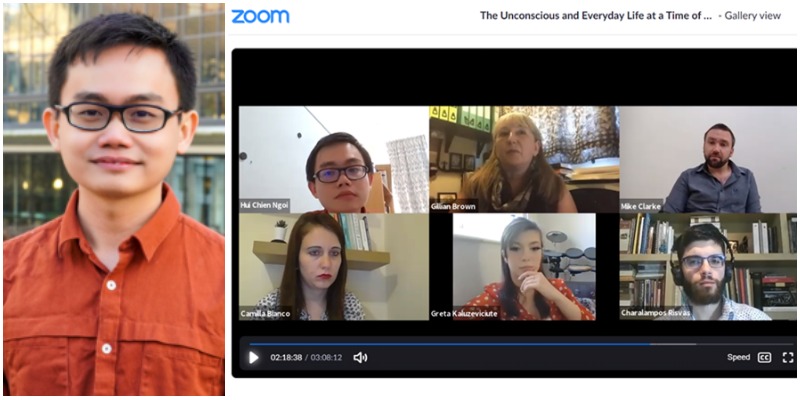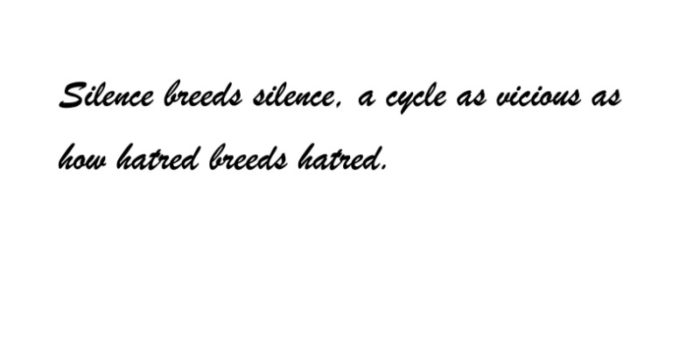For Silence Breeds Silence

The idea came to my mind not long before the deadline. Like the Leeds squirrels that always unexpectedly scamper into my vision, the idea fascinated me but I was not so sure of the ways to capture it. I decided to talk about the relationship between attacks during the COVID-19 pandemic and the Gaze in Lacan. To be specific, my topic concerns the verbal and physical attacks that constantly threaten the Chinese or Chinese-looking individuals. The proposed topic was selected for “The Unconscious and Everyday Life at a Time of a Pandemic” Zoom panel. Little did I know that I was going to be the only Chinese panellist to discuss this COVID-19 topic.
The Zoom panel was held by the Department of Psychosocial and Psychoanalytic Studies at the University of Essex on 29 May 2020 (Friday). The event was open to everyone, but only those selected to deliver a paper at “The Unconscious and Everyday Life” Conference 2020, which has been postponed to October 2020, were allowed to apply to be a panellist. I took the module Reading (with) Psychoanalysis taught by Dr Nicholas Ray in Semester Two. Dr Ray was very supportive of me when I was preparing my abstract for the conference. He guided me to express my ideas clearly in a short abstract. That process was a tough one because our module focuses on Sigmund Freud, and my conference abstract focuses on a topic not covered in the syllabus, namely the theories of the gaze proposed by Lacan and Sartre respectively.
I was not a literature major before, and I do not deny that academic events like this are quite daunting for me. If I remember correctly, I was the only master’s student among the panellists. I have just learnt psychoanalysis for a few months, and the other panellists are so knowledgeable. My courage to submit my applications to both the conference and panel came from Professor Graham Huggan, my tutor for Postcolonialism, Animals and the Environment in Semester One. He strongly encouraged us to join conferences because they, as opposed to many people’s understanding, are not limited to PhD students.
For quite a long time after knowing that I have been selected as a panellist, I did not know how I should begin my preparation. To me, the topic is not just an academic discussion, but something that is closely related to me (so close that it is no longer just a topic to be dissected coldly, but has been inextricably integrated into my life). I am someone who has always been influenced by the culture that, rather than confronting the sufferings imposed, it is better to endure them and let everything subside. It has thus been a shock for myself too to choose such a topic. My social media platforms have been inundated with news of how the Chinese or Chinese-looking individuals suffer from verbal and physical attacks due to the COVID-19 crisis. As I browsed through news and articles during the preparation, my heart sunk like an anchor into a sea of despair.
The intense worries gripped me when it was my turn to present the topic. Never had I expected that I had to deal with such a topic in my first experience of becoming a panellist. Of the five panellists as shown on the screen, I was the only Chinese. There were about 40 attendees whose faces were not shown on Zoom, but their names suggested that I was part of the minority. As I delivered my presentation, a new sensation took over me. For a short moment, I almost forgot that my face was being watched by many pairs of eyes invisible to me. The absolute silence formed a stark contrast to my enunciation, my explication of COVID-19 and Lacan, my delineation of a problem that has always been overlooked. I felt an unprecedented force of liberation in the silence. It was a kind of catharsis of so many perturbing emotions and memories which many of us choose to ignore.

One of the questions during the discussion after my presentation etched itself in my mind. An attendee asked me whether racism is instinctual. I replied that an instinct is something biological, but racism is something formed from the influence one receives. I thought that was a good answer, but when I recall it now, I discover some unsettling messages hidden underneath that question. If racism is a product of social influence, what does it reflect of our society? When certain groups of people still believe in silence under the prevailing threat, what message has been conveyed? Are we not also indirectly causing the aggravation of the problem? Are we waiting to be delivered by some ‘merciful’ beings?
Wait and wait. We always believe that things will get better if we wait, if we endure. Was that the belief that had shrouded me for a long time? I am not sure, but I do believe that the education I received at Leeds makes me question many of the situations which I used to treat as norms. The literature modules here do not just expose me to different cultures, they also open another window for me, showing me that actually we can live another kind of life. However, what is more harrowing about the society is not that the people are unaware of such windows, but that they choose to forcefully close the windows and blame the darkness.
Choosing to annihilate darkness. When I write this sentence now, many of us are engulfed by waves of anguish, and the media is choked by news of a murder—a murder of a helpless life, a murder of human rights, a murder of civilisation. This kind of murder is as fatal as COVID-19 for it deprives a defenceless soul of the right to breathe and has been immune to many kinds of human intervention over a long course of time.

Silence breeds silence, a cycle as vicious as how hatred breeds hatred. As a presenter at a psychoanalysis panel discussion, I attributed racism to the unconscious desire shaped by misconceptions. It is not always possible to explicate certain choices humans make or certain believes humans choose to adopt. It is in such a mist of uncertainty and suspicion that psychoanalysts endeavour to formulate some rules of logic. As humans keep evolving, such rules too keep transforming. However, no matter how humans evolve, racism and attacks seem to always persist. Now when I recall the question about whether racism is instinctual, I regret for not delving deep enough to reveal the horror lurking in the abyss.
Is racism instinctual too? What will Lacan say about it?
